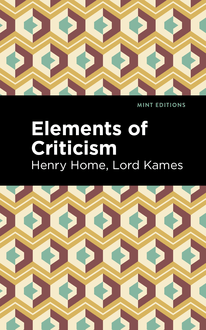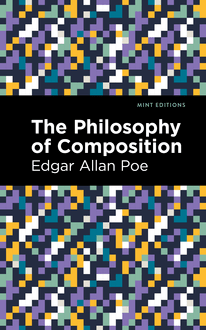-
 Univers
Univers
-
 Ebooks
Ebooks
-
 Livres audio
Livres audio
-
 Presse
Presse
-
 Podcasts
Podcasts
-
 BD
BD
-
 Documents
Documents
-
- Cours
- Révisions
- Ressources pédagogiques
- Sciences de l’éducation
- Manuels scolaires
- Langues
- Travaux de classe
- Annales de BEP
- Etudes supérieures
- Maternelle et primaire
- Fiches de lecture
- Orientation scolaire
- Méthodologie
- Corrigés de devoir
- Annales d’examens et concours
- Annales du bac
- Annales du brevet
- Rapports de stage
La lecture à portée de main
Vous pourrez modifier la taille du texte de cet ouvrage
Découvre YouScribe en t'inscrivant gratuitement
Je m'inscrisDécouvre YouScribe en t'inscrivant gratuitement
Je m'inscrisEn savoir plus
Vous pourrez modifier la taille du texte de cet ouvrage
En savoir plus

Description
The Philosophy of Composition (1846) is an essay by Edgar Allan Poe. Recognized as a foundational figure of nineteenth century fiction, Poe has inspired generations of readers and writers with his craftsmanship and taste for tragedy and terror. His brief but meteoric career shaped the trajectory of American literature forever, forming a legacy without which science fiction, horror, and detective writing would surely be shells of themselves. Published only three years before his untimely death, the essay appeared in an April 1846 issue of Graham’s American Monthly Magazine of Literature and Art, whose editor had previously made the mistake of turning down “The Raven.” Both influential and controversial, Poe’s essay on craft was intended as a dismissal of the myth of spontaneous art, arguing instead that a true artist depends upon attention to detail and adherence to a logical creative process. Using his own poetic masterpiece as an example, Poe claims that the writer must maintain “unity of effect” throughout the work in order to inspire the intended emotional response in the reader. Once this element has been set in place, the writer may proceed with the more technical aspects of composition, such as characters, setting, and plot. Although Poe’s essay drew the ire of Anglo-American poet T. S. Eliot, it was immensely popular among Poe’s Francophone audience and served as inspiration for such artists as Maurice Ravel and Charles Baudelaire. With a beautifully designed cover and professionally typeset manuscript, this edition of Edgar Allan Poe’s The Philosophy of Composition is a classic of American literature reimagined for modern readers.
Sujets
Informations
| Publié par | Mint Editions |
| Date de parution | 16 novembre 2021 |
| Nombre de lectures | 0 |
| EAN13 | 9781513294629 |
| Langue | English |
Informations légales : prix de location à la page 0,0250€. Cette information est donnée uniquement à titre indicatif conformément à la législation en vigueur.
Extrait
The Philosophy of Composition
Edgar Allan Poe
The Philosophy of Composition was first published in 1846.
This edition published by Mint Editions 2021.
ISBN 9781513291772 | E-ISBN 9781513294629
Published by Mint Editions®
minteditionbooks.com
Publishing Director: Jennifer Newens
Design & Production: Rachel Lopez Metzger
Project Manager: Micaela Clark
Typesetting: Westchester Publishing Services
C ONTENTS F OREWORD T HE P HILOSOPHY OF C OMPOSITION T HE R AVEN
F OREWORD
T he initial intention of the publishers to present “The Raven” without preface, notes, or other extraneous matter that might detract from an undivided appreciation of the poem, has been somewhat modified by the introduction of Poe’s prose essay, “The Philosophy of Composition.” If any justification were necessary, it is to be found both in the unique literary interest of the essay, and in the fact that it is (or purports to be) a frank exposition of the modus operandi by which “The Raven” was written. It is felt that no other introduction could be more happily conceived or executed. Coming from Poe’s own hand, it directly avoids the charge of presumption; and written in Poe’s most felicitous style, it entirely escapes the defect—not uncommon in analytical treatises—of pedantry.
It is indeed possible, as some critics assert, that this supposed analysis is purely fictitious. If so, it becomes all the more distinctive as a marvelous bit of imaginative writing, and as such ranks equally with that wild snatch of melody, “The Raven.” But these same critics would lead us further to believe that “The Raven” itself is almost a literal translation of the work of a Persian poet. If they be again correct, Poe’s genius as seen in the creation of “The Philosophy of Composition” is far more startling than it has otherwise appeared; and “robbed of his bay leaves in the realm of poetry,” he is to be “crowned with a double wreath of berried holly for his prose.”
T HE P HILOSOPHY OF C OMPOSITION
C harles Dickens, in a note now lying before me, alluding to an examination I once made of the mechanism of “Barnaby Rudge,” says—“By the way, are you aware that Godwin wrote his ‘Caleb Williams’ backwards? He first involved his hero in a web of difficulties, forming the second volume, and then, for the first, cast about him for some mode of accounting for what had been done.”
I cannot think this the precise mode of procedure on the part of Godwin—and indeed what he himself acknowledges, is not altogether in accordance with Mr. Dickens’ idea—but the author of “Caleb Williams” was too good an artist not to perceive the advantage derivable from at least a somewhat similar process. Nothing is more clear than that every plot, worth the name, must be elaborated to its d é nouement before anything be attempted with the pen.
-
 Univers
Univers
-
 Ebooks
Ebooks
-
 Livres audio
Livres audio
-
 Presse
Presse
-
 Podcasts
Podcasts
-
 BD
BD
-
 Documents
Documents
-
Jeunesse
-
Littérature
-
Ressources professionnelles
-
Santé et bien-être
-
Savoirs
-
Education
-
Loisirs et hobbies
-
Art, musique et cinéma
-
Actualité et débat de société
-
Jeunesse
-
Littérature
-
Ressources professionnelles
-
Santé et bien-être
-
Savoirs
-
Education
-
Loisirs et hobbies
-
Art, musique et cinéma
-
Actualité et débat de société
-
Actualités
-
Lifestyle
-
Presse jeunesse
-
Presse professionnelle
-
Pratique
-
Presse sportive
-
Presse internationale
-
Culture & Médias
-
Action et Aventures
-
Science-fiction et Fantasy
-
Société
-
Jeunesse
-
Littérature
-
Ressources professionnelles
-
Santé et bien-être
-
Savoirs
-
Education
-
Loisirs et hobbies
-
Art, musique et cinéma
-
Actualité et débat de société
- Cours
- Révisions
- Ressources pédagogiques
- Sciences de l’éducation
- Manuels scolaires
- Langues
- Travaux de classe
- Annales de BEP
- Etudes supérieures
- Maternelle et primaire
- Fiches de lecture
- Orientation scolaire
- Méthodologie
- Corrigés de devoir
- Annales d’examens et concours
- Annales du bac
- Annales du brevet
- Rapports de stage










